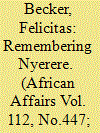| Srl | Item |
| 1 |
ID:
119119


|
|
|
|
|
| Publication |
2013.
|
| Summary/Abstract |
This article examines the changing uses of political rhetoric around the burial of Julius Nyerere in 1999. It argues that the ruling party uses rhetoric as a means of 'soft power', but also documents how this rhetoric, though geared towards legitimizing Nyerere's successors, employed tropes that were rejected by some people and were used by others to critique leaders who were perceived to lack the selfless integrity attributed to Nyerere. The article compares funerary songs by a government-sponsored band, popular at the time of Nyerere's death, with memories of Nyerere in rural areas in the early to mid-2000s. While the image of Nyerere in the funeral songs as a benign family patriarch writ large still persists, it coexists with strongly divergent constructions of Nyerere as an authoritarian ruler or a self-seeking profiteer. Moreover, the 'official', benign Nyerere has been employed not only by government and party faithful, but also by striking workers, opposition politicians, and critical newspapers as a measure of the shortcomings of his successors. The invocation of Nyerere as a paragon of an endangered ideal of virtue in public office indicates widespread anxieties towards a state that often disappoints but occasionally delivers, in unpredictable turns, and the limits of the government's ability to shut down dissent.
|
|
|
|
|
|
|
|
|
|
|
|
|
|
|
|
| 2 |
ID:
178116


|
|
|
|
|
| Summary/Abstract |
This article examines the impact that three political leaders—Seretse Khama, Kenneth Kaunda and Julius Nyerere—had on navigating the long-term risk associated with mass atrocities. While the scholarship on comparative genocide studies has acknowledged the crucial dimension of leadership in the perpetration of such violence, very little is known about the preventive influence of leaders in cases where risk is present. This influence works both ways: the ideas, decisions and policies of political leaders are often the most instrumental factor in effective processes of risk mitigation. Yet to date, there has been no systematic study of the role of leadership in managing and ameliorating risk associated with mass atrocities. Indeed, the more general question of why mass atrocities do not occur is also largely neglected. I argue that these leaders were cognisant of the disruptive potential of tribal, ethnic and religious division; they advocated for inclusive national identities and developed policies that fostered social cohesion; and were effective in creating social and political environments that had an inhibitory effect on structural risk factors associated with atrocity crimes.
|
|
|
|
|
|
|
|
|
|
|
|
|
|
|
|